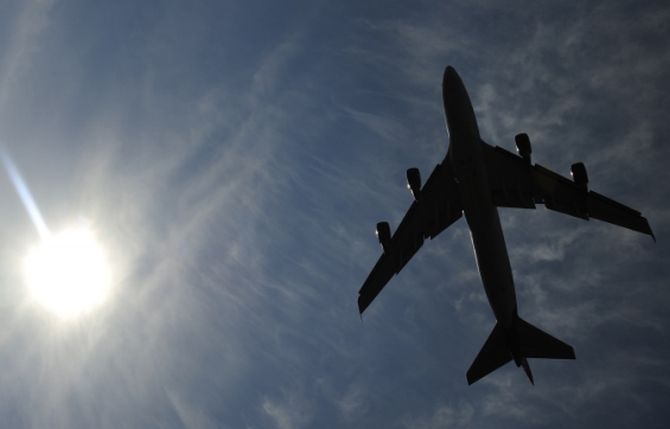Its proximity to popular tourist destinations like Agra, which attracts 45 per cent of the international passenger traffic at IGI, could be diverted to Jewar.

About a kilometre from the Yamuna Expressway, on the two-lane connector near Jewar, a bunch of young men in high-visibility orange vests were busy collecting data from all vehicles coming and going.
When our car stopped near a small, make-shift structure that housed their supervisor, we were welcomed with a broad smile.
Prakash Kumar, the surveyor in charge of the programme, mistook us for state government representatives, arriving for their protection.
Kumar, in his early 30s, is a junior surveyor at a private agency the Uttar Pradesh government has hired to map the traffic flow on the road that connects the expressway and the Jewar airport site.
While the survey was on course, Kumar was weary of the rising compensation-related agitation in nearby villages against the authorities.
Nandu Gautam, a contractual worker hired for the survey and resident of Sabota village, was taking down all required details - the frequency of vehicles, their type and load - diligently.
Sabota is scheduled to be acquired for the project in the second phase but Gautam and his family are clueless about the resettlement package that they expect to be offered.
The scenario is not much different in Rohi village - a major settlement in the region about 5 kilometres from the survey site, going interior.
Unlike Kumar, local residents like Puran Prakash Sharma and Nepal Singh were not happy to see us initially, when they had presumed us to be Airports Authority of India functionaries.
But, with their initial resistance melting, they opened up.
Localities were mostly satisfied with the amount offered to them against the acquired land, they said.
But it is the non-committal attitude of the district administration when it comes to compensating the villagers against their loss of land to feed livestock, electricity connections, and farm-gardens that has kept issues boiling.
According to Singh, despite several representations to the district magistrate, they could secure only verbal assurance on a resettlement scheme and jobs.
The local pradhan estimates about 18 per cent of the land-owners are yet to accept the proposed compensation of Rs 20 lakh per bigha (about 4,900 square yards).
Two pieces of litigation have been filed at the Allahabad high court and the Supreme Court because no written agreement has been offered to the villagers on resettlement and other issues.
“We have been told that every family will be given 50 square yards to set up houses near Jewar.
"But that is too small a parcel per family, compared to what we are giving up,” said Sharma, citing the Land Acquisition Act, 2013, which mandates a compensation of four times the price of land that will be acquired in rural areas.
No construction has begun in the region.
The only physical evidence of the airport project is a range of green metal boards standing on the barren fields, placed by the Yamuna Expressway Industrial Development Authority (Yeida).
Meanwhile, real-estate developers operating in the Noida extension region and beside the Yamuna expressway are hoping for a massive transformation of the region.
To be built in four phases, the Jewar airport is estimated to be the largest in the country.
According to the techno-economic feasibility study by PwC, it would require Rs 15,754 crore to build the facility on 1,337 hectares (147 million square feet).
The first phase, scheduled to be completed by March 2023, will alone require Rs 3,745 crore of capex.
Indira Gandhi International (IGI) Airport, which currently handles 30 per cent of the cargo in the country, gets half of it from regions like Gautam Budh Nagar and Ghaziabad.
Once operational, this entire load is expected to be diverted to Jewar, which is much closer and is better-connected by road.
According to its estimates, by 2027-28 the airport will be handling more than 1.1 million tonnes of cargo per year - more than the 1 million tonnes of cargo that IGI now handles.
Interestingly, unlike IGI, nearly 90 per cent of Jewar’s cargo will be for international destinations.
Moreover, its proximity to popular tourist destinations like Agra, which attracts 45 per cent of the international passenger traffic at IGI, could be diverted to Jewar.
Consequently, by the end of the decade (2029-30) it is expected to attract some 17 million passengers annually.
Manoj Gaur, managing director of Gaur Group, a major realty player in the Noida extension region, is counting on the opportunities.
The group has finished a township on the expressway, some 25 km from the site.
And it is now waiting for new land parcels to come into the market.
According to Gaur, the more than 5,000 acres (217 million square feet) held by the Jaypee Group and under liquidation will be placed for bidding.
“The airport has the potential to extend the National Capital Region towards Jewar,” he said.
According to Ashish Bhutani, chief executive officer of Bhutani Group, which has key interests in commercial projects in the Noida extension region, better infrastructure and planned implementation in the region have now opened it up as a major corporate hub, in competition to Gurgaon.
Photograph: Reuters












 © 2025
© 2025